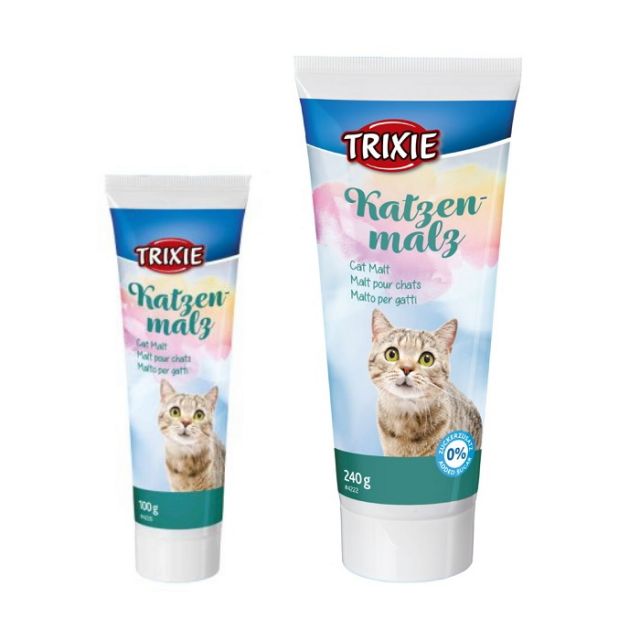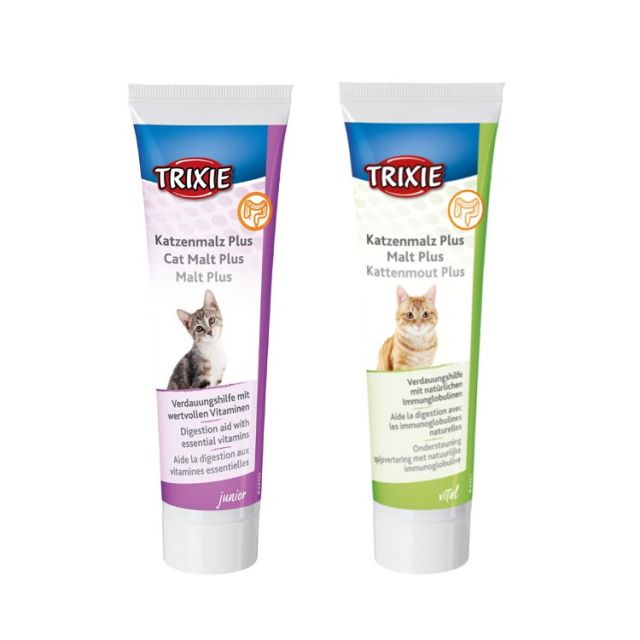Vomiting in the cat
It is not a pleasant sight to see your cat vomiting, but almost every cat vomits now and then. Vomiting once in a while is usually not so bad, but repeatedly vomiting can possibly be alarming. Through vomiting, your cat loses fluids and salts, while possibly eating and drinking less because they feel nauseous. Cats that repeatedly vomit are therefore at risk of dehydration.
Pharmacy4pets has an extensive range of products that support your cat’s gastrointestinal system.
Why Cats Vomit
Vomiting protects the body against harmful substances. After ingesting a stimulating or toxic substance, the body can get rid of it by vomiting. Vomiting can also be caused by other reasons. Below are some common causes of vomiting in cats.
Vomiting Hairballs
One of the most common reasons why cats vomit are hairballs. Cats spend a lot of time grooming their coat. If they swallow a lot of loose hairs, these sometimes accumulate in the stomach, eventually forming hairballs.
Food-Related Issues
- Changes in diet: cats' digestive systems can be sensitive to changes, especially if they happen too quickly or drastically.
- Food allergies or intolerances.
- Eating too quickly or too much at once: cats that gobble often vomit their meal shortly after eating.
- Eating something wrong: raw meat, fish, or eggs and ready-made raw cat foods almost always contain bacteria. Often this goes well, but if they are stored incorrectly, your cat is sensitive to it, or if there are too many bacteria in it, your cat can vomit from eating raw foods.
- Plants: some plants are toxic to cats or cause local irritation of the oral mucosa, esophagus, and stomach, thereby causing vomiting. A notorious cause for vomiting in cats is eating grass. Because grass is sharp and irritates the stomach wall, eating it induces vomiting. Sometimes a blade of grass is not properly vomited out and remains stuck in the throat. This gives the typical symptom of constantly trying to vomit or retch, stretching the throat, frequent swallowing, and sometimes pawing at the mouth or throat.
Gastrointestinal Problems
Infections in the gastrointestinal tract can lead to vomiting. These infections can be caused by bacteria, viruses (for example feline distemper, caused by the parvovirus), parasites (such as Giardia) or other pathogens. Cats also frequently have immune-mediated inflammations of the intestine, such as IBD (inflammatory bowel disease). These stomach and intestinal problems are often accompanied by diarrhea. Not being able to defecate, also known as constipation, can also be a cause of vomiting.
Underlying Health Issues
Causes outside the gastrointestinal tract can also cause vomiting. Chronic kidney disease is common in older cats and can be accompanied by symptoms such as vomiting, weight loss, loss of appetite, and increased drinking and urination. Conditions of the liver, thyroid, and pancreas can also result in vomiting. Male cats sometimes experience a (life-threatening!) blockage of the urethra. In addition to symptoms such as frequently going to the litter box, expressing pain while (trying to) urinate, absence of urine, and frequent licking of the penis, a so-called 'blocked tom' often also vomits.
Is it Really Vomiting?
If a cat vomits food, bile, or mucus, it is usually referred to as vomiting. If you observe your cat closely, you may sometimes realize that what your cat is doing is not actually vomiting.
Vomiting
With vomiting, the stomach contents come out due to a strong abdominal pressure: your cat retches, the abdominal muscles contract, followed by the expulsion of the stomach contents. The stomach contents can consist of (partially) (digested) food, mucus, bile, watery liquid, and/or blood. The vomit can be clear, yellow, green, brown, red, or (almost) black.
Regurgitating
Regurgitation is the passive expulsion of stomach content without prior contraction of the abdominal muscles and retching. You may know this as the ‘acid burp’.
Coughing
Coughing is often confused with vomiting. A cat that is coughing often spits out mainly mucus, no abdominal pressure is seen, and the ‘retching’ is more the harsh clearing of the throat. This ‘throat clearing’ sometimes turning into retching is seen, for example, with a blade of grass in the throat.
For a correct diagnosis and especially treatment, it is very important to try to observe your cat closely to distinguish between vomiting, regurgitating, and coughing.
Tips When Your Cat is Vomiting
If your cat vomits now and then and is not otherwise ill, the following tips may help:
- Brush your cat regularly, especially if your cat is long-haired and/or shedding.
- If your cat vomits a hairball or you see hairs in the stool, give a hairball paste such as Kat-a-lax and Vetoquinol Care Hairballs or psyllium fibers (Iso-Gel). You can also give such a paste preventively once every one to two weeks.
- Ensure you choose plants that are safe for your pet and place them out of your cat's reach if you notice your cat showing excessive interest in the plant. Avoid lilies, which are highly toxic!
- Provide your cat with good and safe food and be cautious with raw foods.
- Ensure your cat eats slowly. Divide meals into multiple small portions throughout the day and use a food ball or a special feeding bowl to slow down your cat's eating pace.
- Be alert to symptoms of underlying conditions that cause vomiting such as weight loss with or without good appetite, and increased drinking and urination.
- Deworm your cat regularly, especially if she spends a lot of time outdoors.
- Ensure a gradual transition to or introduction of new food.
Treatment of Vomiting in Cats
As there are many possible causes for vomiting in cats, there are also many possible treatments. Examples of therapeutic options for vomiting in cats include:
- Medication for nausea and vomiting.
- Supportive medication such as fluid therapy or appetite-stimulating medication.
- Dietary supplements: consider pastes for hairballs or a supplement for cats with a sensitive stomach such as Puur Stomac. If your cat is eating or drinking poorly, you can supplement the salts by giving ORS powder or, if your cat also has diarrhea, Enterogelan paste, which contains both extra salts and quick carbohydrates and helps to thicken the stool.
- Nutrition: feed cats that are vomiting small portions of food and water more frequently. If your cat also has diarrhea, a special easily digestible food is often advised such as Sanimed Intestinal. For food allergies, the advice is to provide hypoallergenic food. If your cat does not eat or eats very poorly, you will probably be advised to force-feed her with special high-energy wet food.
- Treatment of the underlying cause: depending on the cause of your cat's vomiting, the veterinarian may prescribe medication such as corticosteroids, pain relievers, medication that supports the kidneys, or special diet foods for kidney disease or liver support.
- Probiotics: for cats with a sensitive stomach and intestines or during or after a course of antibiotics, probiotics can help promote healthy intestinal flora.
When Should You Go to the Vet If Your Cat is Vomiting?
If your cat is vomiting frequently and/or severely, it is important to consult a veterinarian. Although occasional vomiting can be normal in cats, regular vomiting can be a sign of an underlying health problem.
A thorough physical examination, supplemented with diagnostic tests such as blood and/or urine tests and imaging (ultrasound or X-ray of the abdomen), can help identify possible underlying health problems and establish a suitable treatment.
Consulting a veterinarian is necessary if your cat:
- vomits several times a day.
- regularly vomits over a longer period (once a day or once a week, for example).
- is ill, lethargic, or weak.
- has lost weight (with or without a good appetite).
- is vomiting blood or the vomit looks like coffee grounds (dark brown) or feces.
- is not eating and/or drinking (or cannot keep water down).
- has eaten something that was not intended.
- has a fever (>39.5 degrees).
- shows other symptoms such as drinking and urinating a lot, having difficulty defecating or urinating, severe restlessness, breathing faster or with difficulty, balance problems, a swollen abdomen, or a pale tongue.
If you have a question about our products or about stomach problems in your cat, please contact us.


